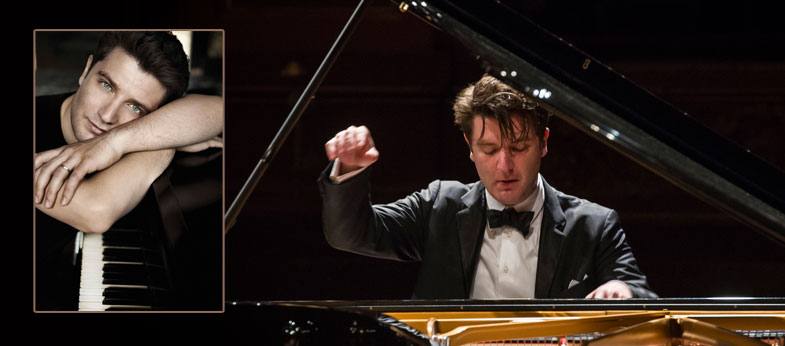

About
“Alessio Bax is clearly among the most remarkable young pianists now before the public.” Gramophone “Editor’s Choice”
Alessio Bax, a pianist of authority, elegance and intensity (as described respectively by the Daily Telegraph, the New Yorker and Gramophone), is praised for his lyrical performances and compelling, insightful interpretations. As First Prize winner at the Leeds International Piano Competition, and the recipient of an Avery Fisher Career Grant and Lincoln Center’s Martin E. Segal Award, Bax is a star on the rise.
He has appeared as soloist with more than 100 orchestras, including the London and Royal Philharmonic orchestras, Japan’s NHK Symphony, Dallas Symphony with Jaap van Zweden, St. Petersburg Philharmonic with Yuri Temirkanov, and the City of Birmingham Symphony Orchestra with Sir Simon Rattle. Bax recently added a Russian album and a lullaby collection (Lullabies For Mila is dedicated to his daughter, Mila) to a burgeoning discography that includes works by Bach, Beethoven, Brahms, Mozart, Rachmaninov and Stravinsky – all of which have been singled out for distinction by the most discerning critics. He was recently appointed Artistic Director of Italy’s Incontri in Terra di Siena Festival for a three-year term starting in 2017.
Program
Program Notes
In 1789, Mozart wrote his only completed clarinet quintet for his friend, clarinetist Anton Stadler. It remains one of the most well-known pieces featuring the instrument. The piano transcription is of the Quintet’s final movement, which is in variation form. Filling in for both clarinet and string quartet, the piano must balance an ebullient melody with light staccato chords. The third variation, in the new key of A minor, is punctuated by the left hand accompaniment. The fourth variation returns to the main theme before the fifth slows to a lyrical Adagio. The sixth variation was the original Quintet’s coda and ends with two quick final chords.
Franz Schubert composed his Sonata in A Minor in 1823, but it was not published until 1839, 11 years after the composer’s death. The publishers dedicated it to Felix Mendelssohn, who championed Schubert’s works. This three-movement sonata has a tragic tone, with a bare and heavy first movement opening melody. Additionally, many sections of the first movement end abruptly and move on without modulation or announcement. The shifts between heavy, heroic, and calm, however, indicate that no one mood prevails throughout the piece. A quiet Andante barely dispels the atmosphere of despair before the chill winds of the final Allegro vivace, at the end of which swift chords and sweeping double octaves propel the sonata to its end.
Alexander Scriabin composed his Piano Sonata No. 3 in 1897 and 1898, early in his career, while he was touring as a pianist and newlywed with his wife, Vera. Scriabin prescribed a program for this Romantic style piece, titling it “States of the Soul.” The first movement, Drammatico, opens in tumult and confusion, building a desire to break free. It finally reaches a tranquil mood that continues through the second movement before the third movement’s touches of sorrow. The finale emerges in hope, with an unusual and dramatic introduction, but ends just as the climax begins, when the audience least expects a conclusion. The ending seems truncated, and one is left feeling that the music should cycle back to the Sonata’s beginning and repeat itself.
Maurice Ravel’s La Valse (“The Waltz”) is a choreographic poem for orchestra that has enchanted its way onto many programs since its first performance in 1920. Ravel had planned a tribute to waltzing Vienna and Johann Strauss, but after the horrors of WWI he composed instead a terrifying tone poem, a bitter and ferocious fantasy. Ravel transcribed it for two pianos as well as piano solo. The innovative introduction gives no indication of a waltz — a low rumble starts the piece as excerpts of waltz melodies are barely heard. Suddenly, the main waltz theme bursts through, followed by waltzes that vary in style. A loud trill and return to the introduction brings the audience into the second half. Each of the melodies is repeated, but with tempo changes, modulations, and new intonations. Wide, sweeping movements of the pianist’s arms cast a glorious effect over the classic waltzes and lead to a danse macabre coda with a final measure, perhaps symbolically, not in waltz-time.